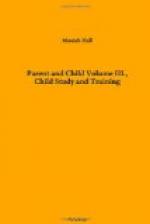There Is No Escape from Wrong-Doing. Mercy Cannot Rob Justice
“Somehow I’ll escape,” is the fatal thought which blinds the poor fool who, for the first time, treads the path of self-indulgence or wrong-doing. But he ought to know that escape is impossible. No cave is dark enough, no ocean deep enough to hide the transgressor from the consequences of his misdeeds. A kind heaven may forgive him, and the one he injures may overlook the offence; but his own body and mind cannot forget; they have registered the deed once for all and it can never be atoned for or forgotten. The doing of a bad deed changes the individual in some particular, slight or great as the case may be, and, pathetic though it seems, he cannot go back and try it over again; the scar remains, as if seared by a hot iron, and, if the hurt is serious enough, heredity may pass it down the ages.
How easily a bad habit is formed. “It won’t hurt me” is whispered by the siren voice of temptation, because the consequences of the transgression are not felt or seen immediately, a second offence seems less serious than the first. Soon habit steps in and stamps the process on mind and body and before the author is conscious of it, a serious appetite or a degrading vice is fastened upon him from which neither time nor effort, prayers nor tears, may ever shake him free.
“Vice is a monster of such frightful mien, That to be hated needs but to be seen, But seen too oft, familiar with its face, We first endure, then pity, then embrace.”
—Pope.
The child must be trained early to know: “The way of the transgressor is hard,” and “He that sows the wind must reap the whirlwind.” It is a great mistake for the parent to step in and free the child from the consequences of his first wrong acts. Let the consequences fall on his own head, and perchance they will teach him wisdom. The true purpose of punishment is to teach the necessity of obedience to law. Everything that is good and desirable will come to him who obeys the law upon which the blessing is predicated; every evil falls on the head of him who constantly violates law. In the final analysis, the punishments which nature inflicts are kind, because they are warnings which, if heeded, will prevent serious injury. The purpose of all discipline is to produce a self-governing individual, not one who needs to be governed by someone else. Until a person learns to govern himself he counts for little in this world.
Two serious mistakes are made in child government. One is the indulgence of a soft, vacillating policy by the parent which permits a child to shirk his duties and to escape from the natural results of his misdeeds. Through the parent’s taking upon his own shoulders the consequences of the child’s wrong-doing, the child is lured into the false belief that duty may be shirked, responsibility set aside, and life be made to yield one sweet round of pleasure. How will a child so trained be prepared to endure the disappointments and heartaches of a world which compels each of us to drink his portion of the bitter hemlock?




